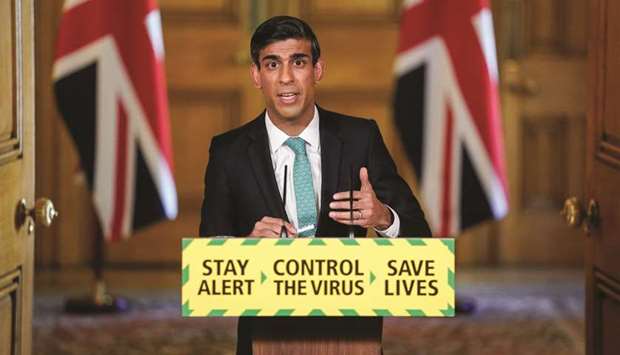Rishi Sunak has confirmed the Treasury is to gradually withdraw its job retention scheme over the next five months, with businesses meeting 20% of the wage bill for furloughed staff by October.
Taxpayers have been meeting the wage bill for 8.4mn workers, at a cost of about £14bn a month, since March.
The scheme was aimed at preventing mass layoffs, as lockdown restrictions caused large parts of the economy to shut down.
Employees have been receiving 80% of their usual wage, up to a maximum of £2,500 a month.
One million firms are using the scheme, according to data released this week.
Sunak said from August, firms will have to pay employer national insurance and pension contributions for staff they continue to keep on furlough.
In addition, they will then have to pay 10% of their wages in September. This will rise to 20% in October.
Sunak said: “We stood behind Britain’s businesses and workers as we came into this crisis and we stand behind them as we come through the other side.
“Now, as we begin to reopen our country and kickstart our economy, these schemes will adjust to ensure those who are able to work can do so, while remaining amongst the most generous in the world.”
The treasury has also brought forward the date at which furloughed staff can be brought back part-time, to July 1.
Business groups had pressed for the change, as rule-changes mean some sectors can reopen – including non-essential retail on June 15, for example.
Firms will only be able to apply for the job retention scheme or furlough additional employees until June 30.
Presenting yesterday’s daily coronavirus briefing in Downing Street, Sunak also announced self-employed workers whose income has been hit by the crisis would be able to claim a second grant.
Those who qualified for the Treasury’s self-employment income support scheme would be able to apply for another payment, calculated as 70% of their monthly profits, up to a ceiling of £6,570.
The first round of payments were based on 80% of monthly profits. Some sectors are tentatively reopening as lockdown restrictions are eased.
With social distancing guidelines likely to remain in force for the foreseeable future, however, many will have seen their previous business model shattered.
As the furlough scheme tapers away, they will face tough decisions about whether to keep staff on the payroll.
Business groups and trades unions welcomed the changes to the scheme.
Mike Cherry, the chairman of the Federation of Small Businesses, said: “By providing employers with the adaptability they’ll require as businesses adjust to a new normal, and bringing forward the flexible furlough launch date, the government is giving hope to small firms right across the UK.”

Chancellor Rishi Sunak chairs the daily Covid-19 briefing at 10 Downing Street in London yesterday.
